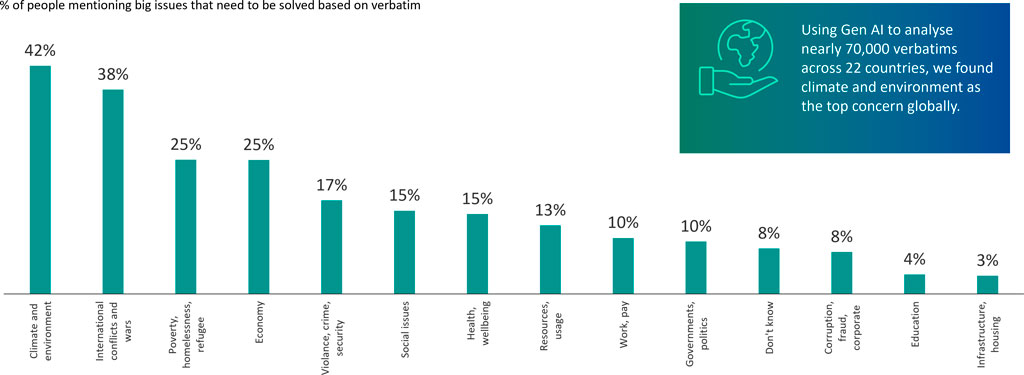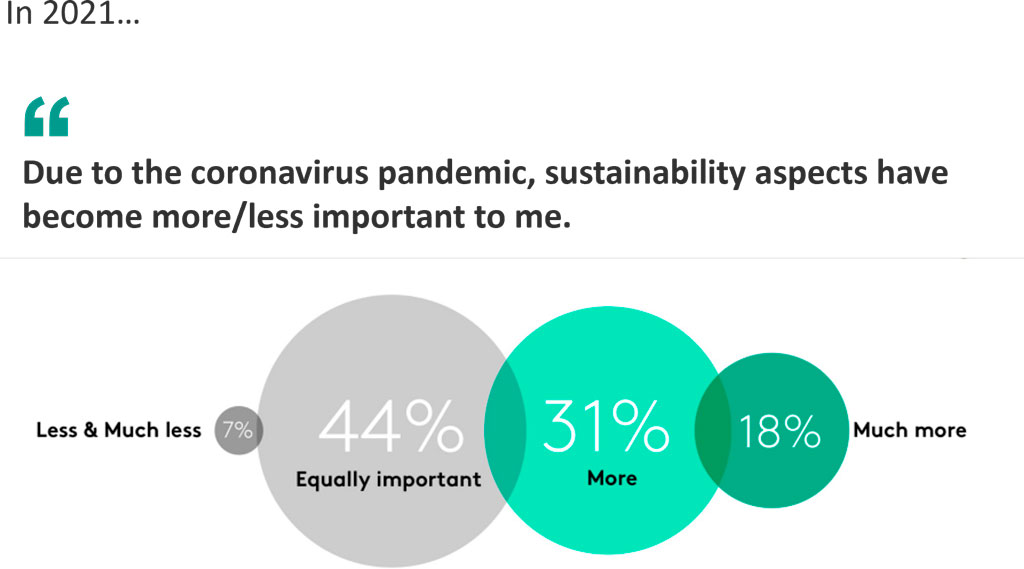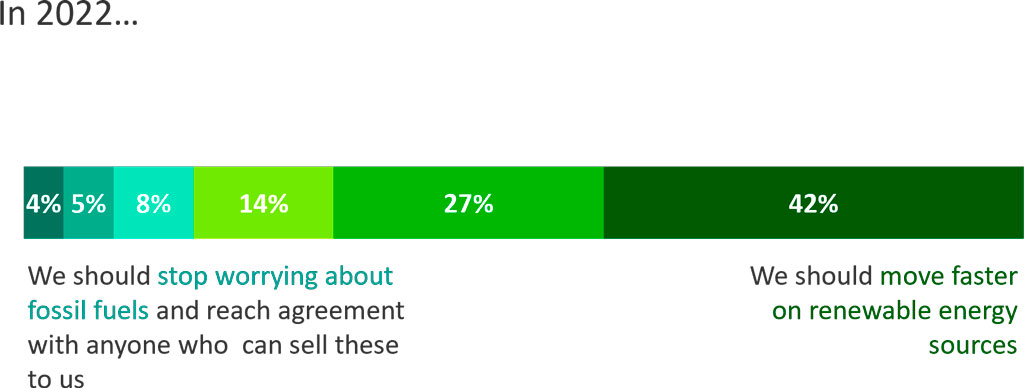Should sustainability still be on brands’ agendas? Recent news, whether that’s political upheaval, tense international relations, or the rising cost of everyday essentials and household bills, has resurfaced this question. During periods of change, it’s even more important for brands to understand and respond to consumer needs, so quality data-led evidence is key.
Sustainability as a key pathway for growth
New Kantar evidence shows that sustainability is still a powerful commercial tool. Our BrandZ data shows us that strong sustainability perceptions can build equity and predisposition for a brand, driving volume and its ability to command a price premium. Sustainability perceptions alone contribute u p to 10% to the value of brands in the BrandZ global top 100 – but even so, these brands are currently leaving a potential $600 billion on the table, according to our latest estimation.
Unwavering consumer demand
In our latest study unpacking consumers’ attitudes, Sustainability Sector Index 2025, people told us in their own words what are the big issues happening that they think should be solved. Between November and January, we collected nearly 70,000 verbatim answers to this question across 22 markets, giving us qual-style in-depth understanding at a global scale. We used our latest GenAI technology to analyse the responses. The results found that climate and environment-related issues remain people’s top concerns globally, taking top place ahead of international conflicts and poverty and homeless, demonstrating how universal a desire for action truly is.

And it’s also important to remember that ‘sustainability’ is just an umbrella term that encompasses a range of social and environmental issues that people deeply care about. With consumers it’s never been about ESG or corporate strategy. It’s about poverty, climate change, pollution in our air and water, it’s about devastating extreme weather events, economic inequality, our health - mental and physical. These are just the big topics. Sustainability always means better: for the planet, for the people and for the long-term health of the global economy.
Our Sustainability Sector Index study reveals that people feel the impact these issues have on their lives and that for many, the cost of inaction is becoming increasingly tangible.
72% expect to personally feel the effects of climate change in their lifetime. And 68% already feel impacted by environmental issues.
And what that means for people is a threat to our quality of life, to the natural richness of our planet, and to our health, with these issues already costing significant loss of human life.
The security shift in an era of great volatility and disruption
The movement for adopting a more sustainable lifestyle really accelerated in 2020, solidifying sustainability as a key opportunity for brands to better connect with consumers.

In 2021, COVID disrupted the world. And the question over whether sustainability should be deprioritised raised its head. What we learned is that the disruption caused by COVID did not derail people’s sense of urgency on sustainability. On the contrary, topics related to sustainability became more important. Not less.
In 2022, production of goods ramped up once more after the hiatus caused by the pandemic, and energy prices surged again when Russia invaded Ukraine. And the world was hit by inflation causing an increased cost of living. And the question was raised again: in this context, should sustainability be deprioritised? And what we learned through this energy crisis is that 83% of people globally agreed that we should move faster on renewable energy sources and that we should not make short-term decisions. The disruption prompted consumers to call for greater leadership from brands, not for them to roll back.

Today, we find ourselves in a world where global temperatures in 2024 rose more than 1.5C above pre-industrial levels for the first time in a calendar year. And people show an unwaveringly strong determination to do whatever they can to fight social inequality and injustice (as 76% of respondents in our Sustainability Sector Index 2025 said), as well as fight climate change (73%) . These figures haven’t changed globally since 2023; USA percentages though have increased on both fronts.
However, while people recognise their own responsibility for solving these issues, they do not accept that the responsibility is theirs alone. Brands shape our lives in countless ways: the places we live, the food we eat, the clothes we wear, how we move, the energy we use, and how we manage our money and so on. They are the backbone of everyday life. It’s no surprise that people are looking for brands to provide a pathway to living greener lives in a fairer society.
A route to building meaningful difference and long-term value
At Kantar, we know how brands grow. Brands that are meaningfully different to more people command 5x the penetration today and have a real advantage in penetration growth over the next two years.
- Sustainability can drive perceptions of meaningfulness, if the brand articulation is relevant, connected to category needs and authentic to deliver value.
- Sustainability can impact difference perceptions - taking a lead on sustainability can help the brand to stand out and find new spaces.
- Sustainability can also have an impact on salience, as efforts and actions are a good reason to communicate more broadly to predispose more people and can generate earned media when shared socially.
Meaningfully Different brands have deep and broad mental connections - you need to stand for something and provide it consistently to more people, whenever and wherever they come in to contact with you. It’s true for any positioning and certainly true for sustainable marketing. Whilst reacting to the news and taking short term decisions might be tempting, rolling back commitments on environmental or social issues hurts equity.
Unlocking growth through sustainable marketing means that people have to believe that buying a given brand or product/service is going to make a difference, otherwise why would they? With already high levels of perceived greenwashing, trust is the currency of change. It's in disruptive moments that people can see the difference between brands that are committed to change for the better and brands who do these things for marketing purposes. Organisations that invest in genuinely understanding their customers' expectations and values can create meaningful connections that transcend short-term regulatory changes. Only the committed will build long term value from these efforts.
Unlocking the commercial power of sustainability
We are in a time of great volatility and disruption. And the evidence shows that going forward, emotional security will be more and more important to building brand equity. Brands must lock down trust if they are to be a haven of stability and safety during disruptive times. More than in the past, brands today must build trust on the basis of societal performance, not just product performance. Consumers are holding brands accountable to a set of responsibilities and expectations. Brands must deliver greater value, not less, by powering up for the challenges and opportunities ahead.
The question is how do we move forward? And how do we truly unlock the commercial power of this demand?
We can help:
-
Identify the reshaping consumer dynamics in your sector
-
Unpack cultural shifts for relevant global/local activations
-
Measure how your brand’s perception on sustainability influences your equity
-
Shape your path to brand building through sustainability

